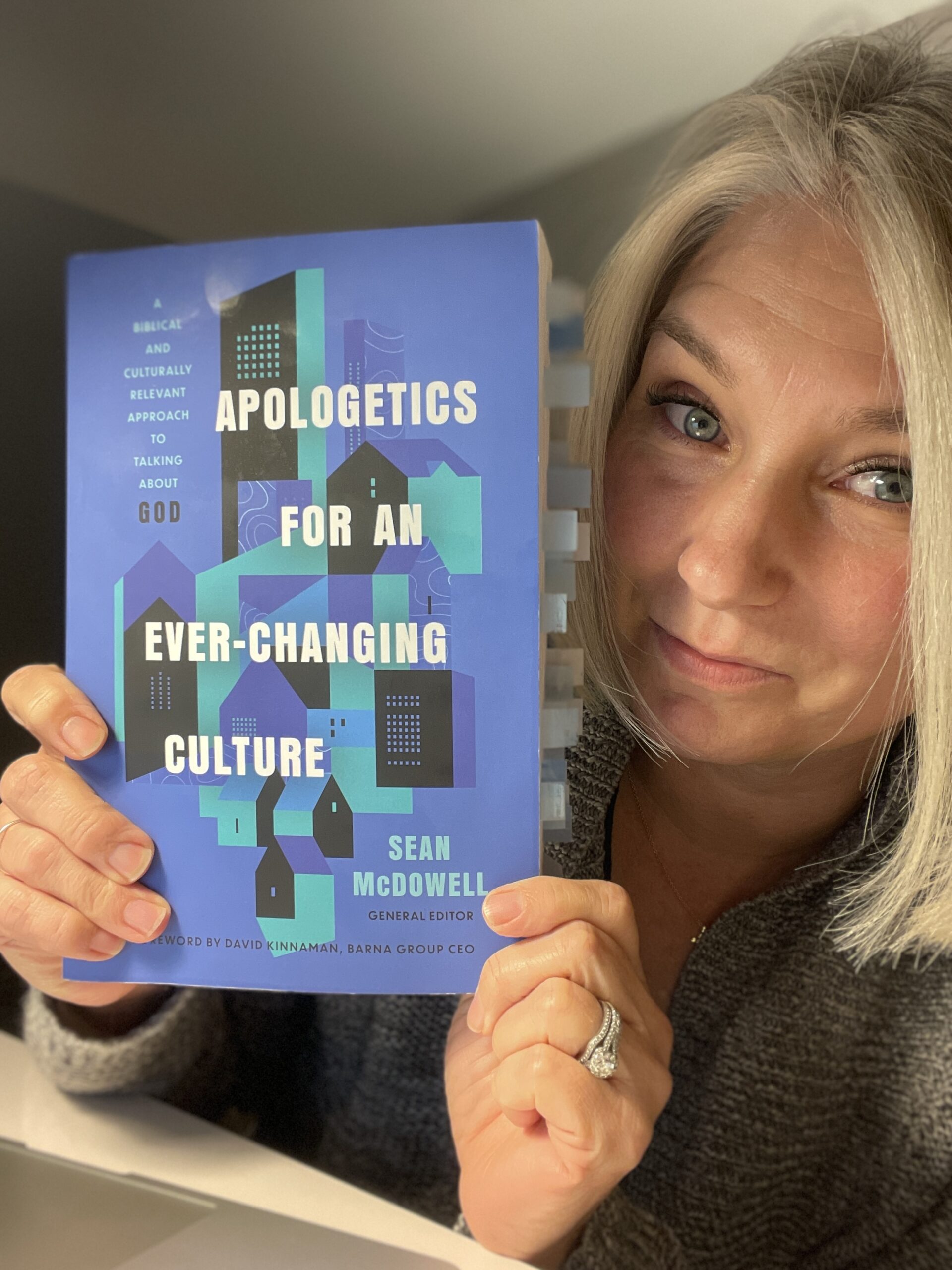TEACHING WOMEN TO GRACEFULLY DEFEND THE CHRISTIAN FAITH AND BIBLICAL WORLDVIEW.

Helpful Tools & Resources for Improving Your Bible Study
One of the most amazing parts of God choosing to have you live in the world at this time in human history is the incredible access you currently have to a wide variety of helpful resources and tools you can use to study the Bible. Below I’ve included some helpful information on the various kinds of resources and tools you may find useful as you study through God’s Word. For specific recommendations including links visit the Resources page.
Bible Basics
If this is your first step into Bible study, welcome! I am so excited for you. Nothing will change your life more than knowing Jesus. After that, nothing will impact your walk with him more than knowing his Word. I have a short (20-minute) free video course available to you at biblebasicscourse.com. It’s a great way to get a quick overview of what the Bible is (and what it isn’t). I’ll walk you through how bible addresses (books/chapters/verses) work and how the Bible is divided into two sections: the Old Testament and the New Testament. Feel free to share the url with anyone you know who might want to get a basic understanding of the Bible. It’s a free tool for anyone!
Bible Translations
It’s unlikely you are reading the Bible in its original form (scrolls), or its original languages: biblical Hebrew, Aramaic, and Greek. More than likely, you’re studying a Bible translation, written in your native tongue, likely English. But your copy of the Bible hopefully is a translation, not a paraphrase. There are several different types of Bible translations, and you can learn more about each type by visiting lizcobo.com/bible-translations. For this study all biblical references and quotes will be from the English Standard Version (ESV) published by Crossway. The ESV is a literal translation meaning the text in English has the equivalent or same meaning of the text in its original language. A literal (or formal) translation does not have the same risk of paraphrasing God’s Word as it is not trying to fit the original text into a contemporary/modern tone. Yes, literal translations can feel a little harder to read than ones written in a more modern tone, but I’d rather have to work a little harder than risk misinterpreting God’s intention by reading something that is a paraphrase.
Bible Commentaries
Outside of the Bible, good biblical commentaries are hands down my favorite study tool. Biblical commentaries “comment” on the Scriptures. In addition to interpretation they tend to offer helpful, informative content including historical context. If you want to understand what life was like for Jesus’ disciples, it’s helpful to read about what life was like in ancient Israel. Commentaries can help you to do that. They can also provide good exegetical interpretation.
Not sure what exegetical means? Don’t worry, we’ll go over it in Week One of our study on How to Properly Study Scripture.
Bible Concordances
A Bible concordance is an index of words from the Bible, listed alphabetically. Each word includes the bible address where the word is located within the text. Imagine you hear a verse, but you can’t remember the entire verse. You can use a Bible concordance to look up the word or words you can remember, which will hopefully lead you to the verse in question. Depending on the version of the Bible you are using to study, you may find that the publisher has included a small concordance (usually in the back). If you really love words, you might find an exhaustive concordance like Strong’s Exhaustive Concordance of the Bible. In addition to the printed version (which is very bulky), you can find online versions of concordances. My favorite way to utilize a concordance is online through the website blueletterbible.org. Because different translations of the Bible use different words, concordances are translation-specific… which makes using the online versions very helpful. Strong’s Exhaustive Concordance has numbered each of the words in both the Old Testament and New Testament. Once you have the correct number for a word, it makes it easy to find where else the word is used.
Bible Dictionaries
Bible dictionaries are just like regular dictionaries, they provide definitions of words found in the Bible. They also include other helpful information like the etymology of a word, pronunciation, etc.. Some Bible dictionaries include images and illustrations. Nelson’s Illustrated Bible Dictionary is my personal favorite.
Cross References
Cross references are typically found at the bottom of the page of your Bible. They point you to the other places in the Bible, by biblical address (book, chapter, and verse) where the same idea or text occurs. You’ll find many cross references within the snynoptic gospels of Matthew, Mark and Luke in the New Testament.
Devotionals
Devotionals can be a great tool, but I like to think of them like dessert. If all you ever ate was dessert, it wouldn’t be very healthy for you. You need to nutrients of the “real-thing.” For example, I enjoy the Morning & Evening daily devotional by Charles Spurgeon. But if that’s all I ever read, I wouldn’t be a student of the Bible. I’d be a student of what Charles Spurgeon, who lived in the 19th century, thought about the Bible. It’s critical that we get our information about God first-hand, from God. The only way we can do that is by studying the Bible for ourselves.
Lexicons
A Bible lexicon works very similar to a dictionary. Inside you’ll find definitions and the meanings of words that occur in biblical Hebrew or Aramaic in the Old Testament and Koine Greek in the New Testament.
Apps & Websites
There are many apps and websites you can use to help you study God’s Word. I keep a current list of my favorites on my website at lizcobo.com/resources. When choosing an app or website it’s always a good idea to spend a little time digging into the source (author, publisher, organization, etc.) to confirm that their approach to scripture is aligned with yours. The first thing I look for on a new website from a Christian (person or organization) is their Statement of Faith/Beliefs — here’s mine. It’s a quick way to know if their content is biblically sound.
Leave a Reply
RECENT
Blog Posts
Have you ever wondered if the Bible is reliable? Can you trust that what’s written in Scripture is correct? You can! And not just because you believe the Bible is reliable, but because the Bible has proven itself to reliable again and again. In this episode of the unBibled podcast, host Liz Cobo shares the […]
READ THIS POST
filed in:

It can be overwhelming to start reading the Bible if you’ve never done it before. It’s a big book! But don’t let the size of it intimidate you. While a lot of people recommend starting with the gospels in the New Testament, particularly the Gospel of John, I prefer to start at the very beginning […]
READ THIS POST
filed in:

Have you ever wondered what Christian Apologetics is actually about? In this episode of the unBibled podcast, host Liz Cobo explains what the word apologetics means and why ALL Christians are called to always be ready to “give a defense” for the hope they have in Jesus. I’d love to hear from you if you […]
READ THIS POST
filed in:

If you’re going to choose only one book on apologetics this year – read this one! Apologetics for an Ever-Changing Culture is a must read for any Christian who wants to be ready to share and defend their faith and worldview in our rapidly evolving culture… and to do it as the Apostle Peter encouraged, […]
READ THIS POST
filed in:
"Beware of false prophets, who come to you in sheep's clothing but inwardly are ravenous wolves. You will recognize them by their fruits. Are grapes gathered from thornbushes, or figs from thistles? So, every healthy tree bears good fruit, but the diseased tree bears bad fruit. A healthy tree cannot bear bad fruit, nor can a diseased tree bear good fruit. Every tree that does not bear good fruit is cut down and thrown into the fire. Thus you will recognize them by their fruits."
Matthew 7:15-20 ESV
Develop your apologetics and Bible study skills
Join the Email List
OPT OUT AT ANY TIME